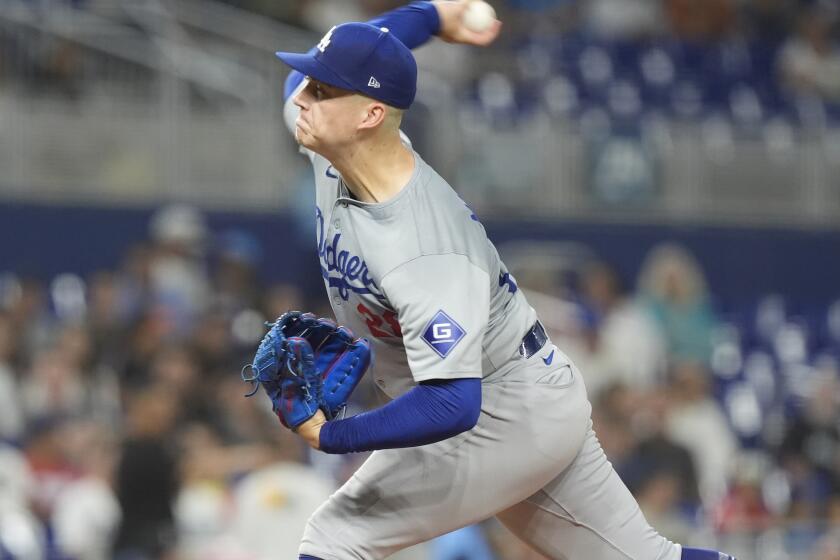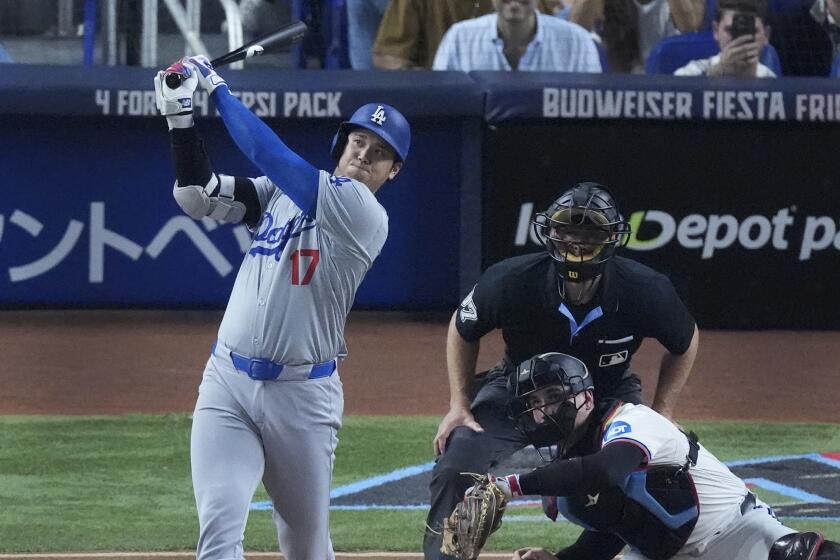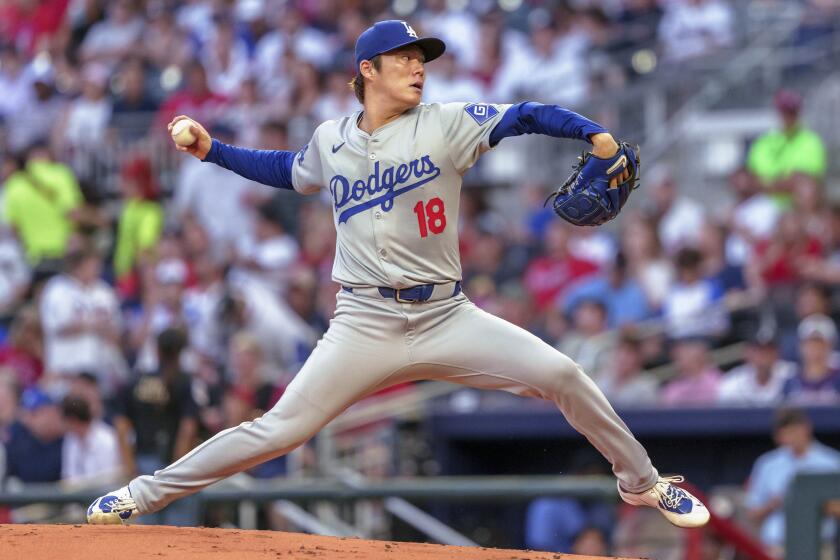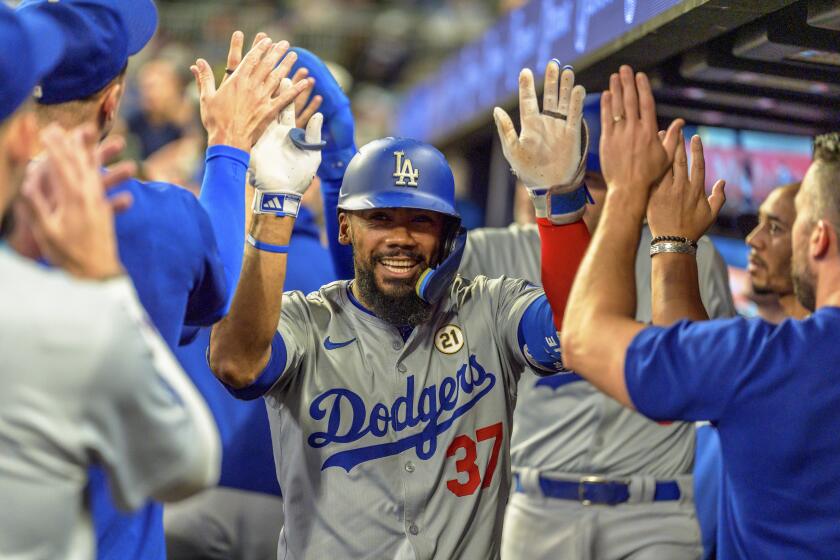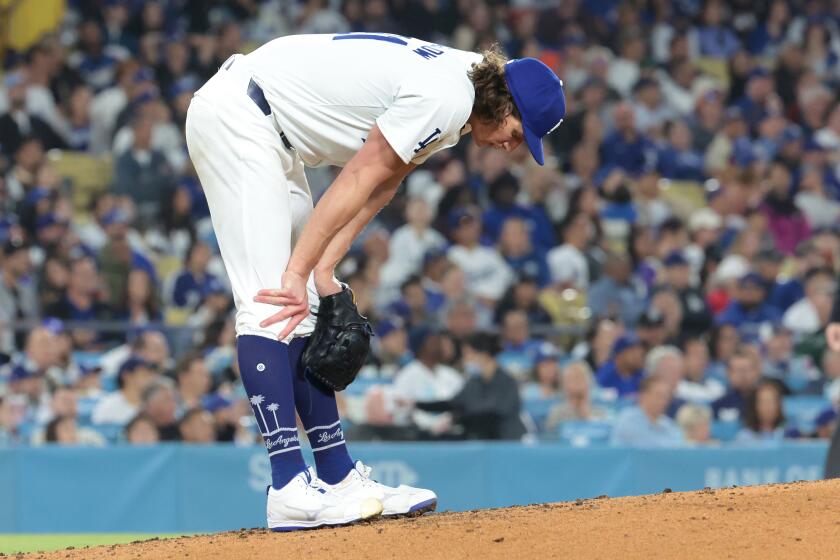‘Well, it figures’: Vin Scully eloquently voices Dodgers’ ending
This column is dedicated to the 42,473 who were at Dodger Stadium on Tuesday night when the flame finally flickered out. You missed out.
Yes, we couch potatoes saw you, squirming and grimacing and putting your hands over your eyes as the drama churned like boiling water. If your spine didn’t tingle, then you don’t have one.
Sure, part of us sitting at home were envious of not being there, of not being amid the crowd in the perfectly climate-controlled Southern California night when so much mattered. We would not have the ticket stubs, like you do, to show your grandchildren. We could not feel the crack of the bat quite like you could, or smell the squeezing vise of tension crushing its way from the upper deck down to the expensive seats.
But we had pictures. And we had the poet laureate, painting his word masterpieces from the broadcast booth. Both the joy and anguish of baseball will be so much less so when Vincent Edward Scully, now 84, finally chooses to spend his time with his grandchildren, rather than us.
But until then, we must celebrate, appreciate and cherish what he gives us, how he teaches and enriches and helps our understanding of how the rhythms and quirks of a silly game that means little in the totality of life can make our heart beat so fast and our goose bumps get so big.
Nor is this meant to be merely an ode to Vinny. There have been so many of those over the years, to the point where even he is probably sick of them. More, this is an ode to the game and the moment.
Baseball moves slowly, through 162 games of mostly inaction and general insignificance. Much of our younger generation watches, rolls its eyes and starts to fidget. What do grandpa and grandma see in this? It takes three hours, it’s often 2-0 and the hot dogs are squishy. Give them MMA with instant blood and the X Games with frequent crashes.
But when you get to the seventh inning of the season’s Game No. 161, the Dodgers are playing the hated Giants, the news has arrived a few innings earlier that a victory means there is still hope for a playoff spot, and then Mark Ellis tries to stretch a marginal double into an impossible triple in a one-run game, there is nothing to compare it to in sports.
If we don’t know, Scully immediately advises us. This is the kind of moment that we may be talking about all winter, maybe through several seasons of looking back. It isn’t Billy Buckner because there isn’t quite as much at stake. But it is almost worse, because Buckner’s gaffe was physical and Ellis’ occurred between the ears, where ensuing regret somehow weighs more heavily.
Scully’s tone is sympathetic toward Ellis, whom he knows may be carrying this one around on his mental shoulders for a lifetime. It is also reportorial for us, in case we have just started watching baseball seriously this year, or we had just dozed off.
And the tone remains, although with a slight boost of alarm volume when Shane Victorino, the next batter, triples over the top of first base. Yes, that would have tied it, 4-4, had Ellis not over-tried and under-thought.
Scully finds a way to ease Ellis’ pain by treating the proceedings as a parent would with one naughty child and an underachieving sibling. Matt Kemp strikes out and Scully, ever so gently, enters him into the who’s-to-blame equation. Remaining are still two innings, six outs, an eternity of baseball twists and turns. Scully has been there so many times before, when 4-3 feels like 15-2. Now, we couch potatoes know, and he makes sure we feel it with him.
Andre Ethier opens the bottom of the ninth with a single. Hope springs and tension suffocates.
A Dodgers loss is the end. With that, all that is left is a sleep-walk through one more game and a dash to safe havens with suitcases full. The Cardinals make the playoffs and the Dodgers head for winter caves.
Dee Gordon, faster than a speeding bullet and almost as skinny, runs for Ethier. The Giants pitcher throws to first five times. The crowd boos each toss. The camera work, often overdone in these situations, is perfect this time. We see tortured faces of fans; also, players spitting, now from nerves rather than just bad habit. Batters step in and out. The pitcher twiddles, twitches and postpones the inevitable.
Scully, having immersed us in this dripping drama, now says he will “shut up and let the pictures tell the story.” Then, of course, he cannot. Do poets put the quill down when presented with wavy fields of wheat, or crashing ocean waves?
Like any great novel or any great baseball game, the ending is fittingly heart-rending. This time, as is often the case, fiction is outdone by fact and the baseball gods. Mark Ellis is the batter, the final hope with two out and Gordon in scoring position at second base.
It is cruel, dramatic, spellbinding. Perhaps even a bit evil. Or, as Scully says, “Well, it figures.”
When Ellis’ soft line drive settles into the glove of the center fielder, and playoff baseball leaves Southern California without a dog in the fight again, Scully neither belabors it nor deflects it. His team has failed to win, but has succeeded in giving him yet one more canvas for one more Picasso.
In the end, it was a night of baseball and drama when you should not have been there.
bill.dwyre@latimes.com
More to Read
Are you a true-blue fan?
Get our Dodgers Dugout newsletter for insights, news and much more.
You may occasionally receive promotional content from the Los Angeles Times.




